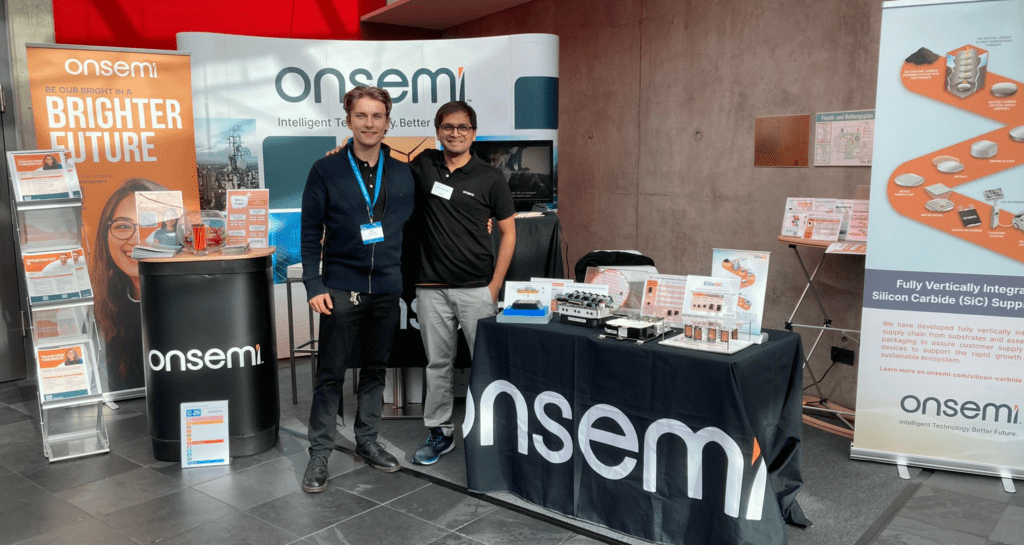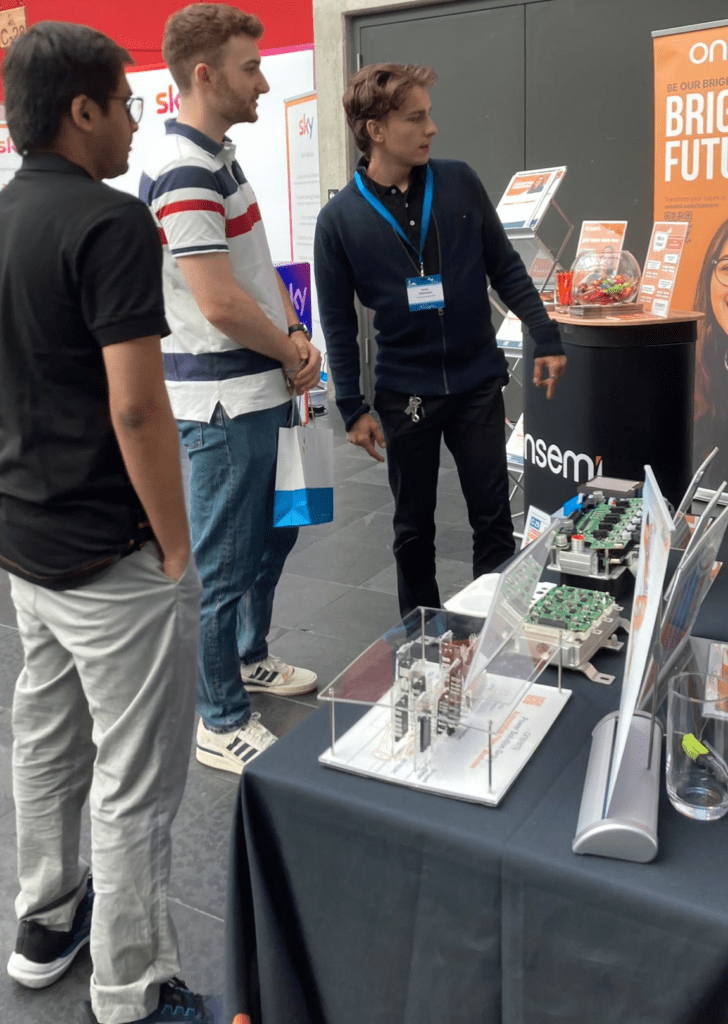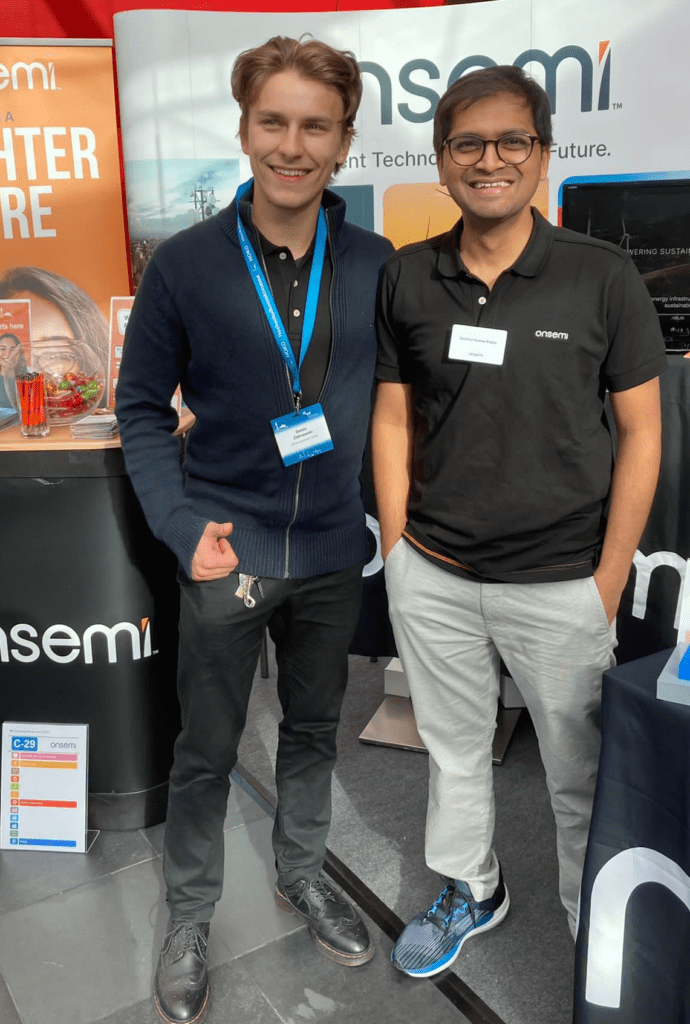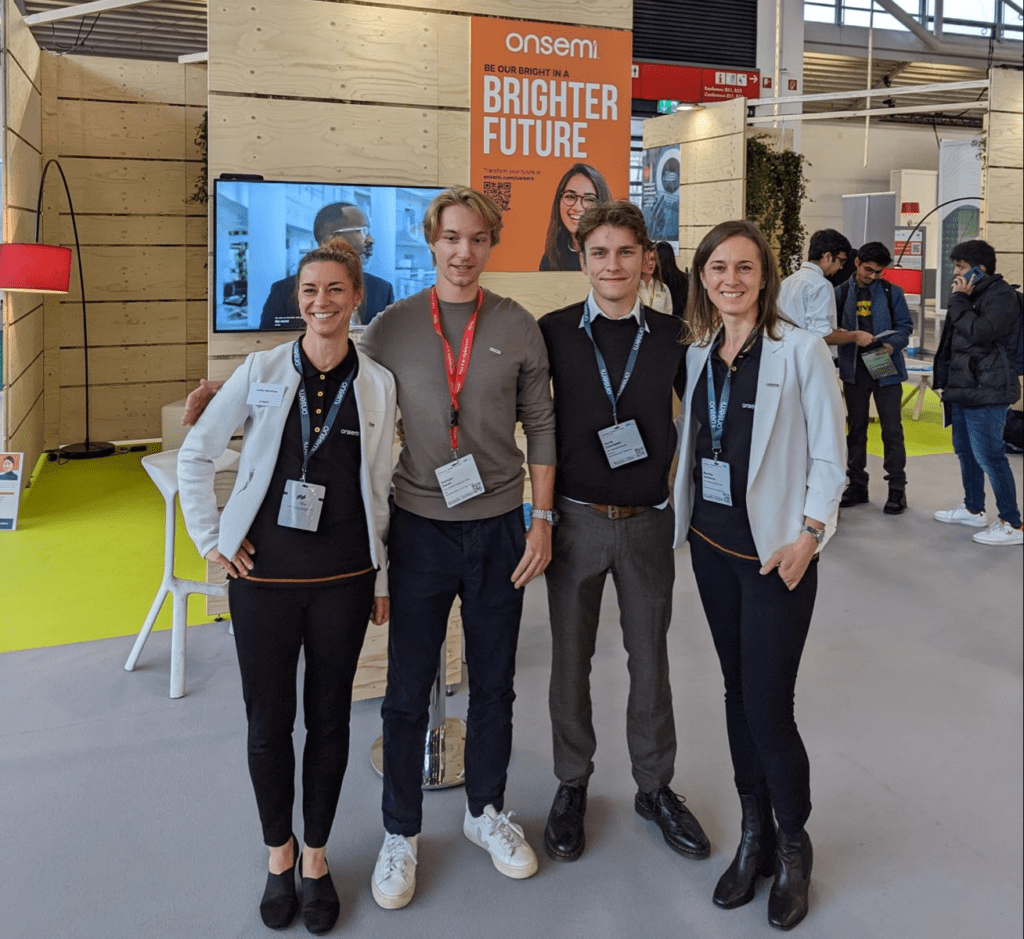How to become a Field Application Engineer
How do you become a Field Application Engineer and what does the job involve. This article focuses on how to become a Field Application Engineer (FAE) with Denis Zebrowski sharing his career so far. Denis studied in Poland, Sweden, and Germany, and now works for onsemi in Germany as part of their Field Application Engineering team. Denis supports customers in the automotive and E-bike industries.
Life as an FAE for onsemi in Germany– meet Denis Zebrowski from Poland


Background to becoming a Field Application Engineer
Could you give a brief description of your background and what led you to study electrical engineering?
My path in education was not that straight and clear at first. I did my Bachelor of Science (polish: inzynierka) in Mechatronics in the mechanical department of the University of Technology in Wroclaw. There I realised my interest lay in electronics and automotive. After graduating I moved to Berlin where my mom lived, and I started applying for different master programmes. I gained a place on a double-degree master programme funded by the EU (European Union) called ICT Innovation. This had a major in Embedded Systems which was led as a sub-programme of Computer Science.
Were there any childhood interests which were a factor?
In my childhood I was very passionate about drawing and wanted to become an architect. Afterwards, just like any other boy back then my main hobbies were riding bikes, playing football, and playing computer games. I did not think about studying engineering until high school.
Has there been a particular person at school or in your family who suggested engineering?
Probably not, I am the first in my family to study engineering. My grandfather studied forestry and wood technology and I consider him as my main inspiration when it comes to education.
Which engineer or scientist has most impressed you?
I come from Poland so I would give a shout-out to:
Nicolaus Copernicus,
Maria Curie-Sklodowska,
and the Polish Cipher Bureau that helped to break the Nazi Enigma machine.
Why did you decide to study mechatronics and robotics rather than a different type of engineering?
I did not have a clearly defined career path after Matura (equivalent to A-levels exams or High School graduation). So, I went for an interdisciplinary programme rather than a single discipline.
Moving to study in a different country
You started your studies in Poland and then completed them at the Technische Universität Berlin and KTH Royal Institute of Technology in Stockholm.
Correct!
How did you adjust to a new country?
Language is always the key to successful integration. During my bachelor’s I completed Goethe B2 in German. Then after moving to Berlin, I got a free-of-charge C1 German Integration Course from the job centre (Arbeitsamt). At the end I finished by passing C1 TELC. It was not easy at times, but I consider it as a life-changing experience.
What did you notice about the difference in teaching styles?
Teaching styles at universities always depend on the tutors.
Did you work as well as studying in Germany?
Yes, thanks to the broad availability of student jobs (Werkstudentjobs) in Germany it is much easier to live a decent life without relying on your parents.
How does fluency in three languages help you in your career? Has it also made you a better communicator?
Although it is not a must anymore to know German in Germany, it made me more confident in my daily life when communicating with others. As well, I learned a lot about the German culture, habits, etc. in the process. It is only required in specific positions if you are an engineer (e.g. in a leadership role). However, it should not discourage you from taking up the classes- especially when in the case of onsemi, the company pays for it.
Internships
You had some internships while you were studying. How did this work experience help you with your studies?
It was crucial for building up my self-confidence. I did not work while studying in Poland and Germany’s market was completely new to me. Taking up my first student position at Joyson SS was another life-changing experience.
Do you think all students should have work experience in this way?
All students should try and see what works best for them. If your financial situation is more relaxed and you want to focus solely on academia you can also take up some position in a student group, research, or any other groups available at your university. This is a great way to meet new and inspiring people. Just make sure you use the time as a student to the fullest. Maybe one day I will go back to do my PhD.
Moving into Field Application Engineering
After working as a systems engineer and application engineer, why did you decide to make the move to field engineering?
I believe that everybody comes with a different ratio of soft and hard skills. While my goal is still to maximise my hard skills, I wanted to make use of my soft skills so that I could have a more comprehensive experience during my career. I think being an FAE does exactly this and I am thankful I accidentally found my current role on LinkedIn.
Apart from technical knowledge, what has helped you to make the move?
I think openness and willingness to try something new were key as I had no clue what awaited me when I applied for the position. I was also encouraged by the management of onsemi who seemed like a bunch of nice, relaxed people. This seemed attractive from the perspective of a fresh graduate.


Typical week as a Field Application Engineer
What exactly does your role include and what’s your typical week like?
To give a snapshot, a FAE’s activities can be classified into two: customer support and application engineer work.
Mostly you are occupied with requests from customers which can be anything technical that deals with your company’s product that you have been assigned to cover.
In the remaining time you can work on a technical publication or support the business unit that develops the products that you cover.
How has this changed during your first year as an FAE?
It has not changed much as I wanted to support customers from day one. Even though I was still in my 6-month trainee programme, during which you are formally working for the business unit, I was immediately involved with my customers.
Which devices do you support?
I support the Bluetooth LE portfolio of Application Specific Standard Product (ASSP) devices and automotive Ultrasonic Park Assist processing devices among major automotive clients.
I also support one leading E-Bike manufacturer with any devices they request.
So, the scope of support might vary, it can be about a particular customer and its application, or about a technology and product with no regard to a specific customer.
Which industries do you work with?
Automotive and E-Bike at the moment.
Travel and support as a Field Application Engineer
How much travel do you do, and how do you maintain a work life balance?
In the beginning during my trainee period, I was sent to Canada and the USA to our Business units. Afterwards I visited a few customers to introduce myself.
I have not done as much travel in recent months which I have appreciated. Nowadays most things can be solved remotely which saves time and CO2. In my case there is not much need for face-to-face meetings, but it might change in the future depending on my involvement in the projects and other factors.
As an FAE you have to be flexible as your working times can vary drastically if you find yourself supporting a high-priority intercontinental project. Personally, my routines are not written in stone, so I welcomed such an environment when I joined it.
Which other people/departments give you support? (e.g. sales, software, quality)
I talk with everybody. Whenever I cannot solve something myself, I try to find people that can help me. I work with great people from different continents and the team is crucial in my daily life. As an FAE you might work with any kind of technical topic- hardware design, software development, quality assurance, qualifications and testing, requirements etc. Commercial topics are usually handled by your sales counterpart who is your partner in daily work life.
Life in the field
How commercial do you need to be?
Just a little is sufficient but the more the better. You might be involved in preparing business and market analysis to identify potential gaps and new customersWhy do you personally like life out in the field?
I like meeting new faces, learning about new technologies and, most importantly, presenting to an audience. But I started liking it only after I became a Field Application Engineer (FAE).


Most challenging part of the job as a Field Application Engineer
What do you find most challenging when you are working?
Technical questions tend to be most complicated to answer as I get them most often and the scope is vast. On the upside, as time goes on, you start to notice that some questions repeat themselves or are slightly different so you can reuse your previously collected data.
What has been your most challenging issue to date?
I have one automotive customer that uses our Bluetooth LE product. The issues and complaints coming from them are so detailed and well- tested that I usually require the help of my colleagues from the business unit to solve them. But every time I learn something new.
What do you do when a problem seems unsolvable?
You are never completely alone and my colleagues in the applications team provide great support.
Have you arrived somewhere and found an issue unbelievably easy to fix?
Of course, sometimes there is no issue- you just measured something incorrectly – ha ha.
New engineers – how to become a Field Application Engineer
What makes a good FAE?
Technically, the quality of your support depends on your expertise in the technology you cover. I believe in learning by doing which seemed always to work best for me. Keep in mind, technologies change with time so you should be open to change/adjust your area of expertise. The fundamental knowledge which you acquired at the university can be reused among multiple areas so do not be worried your knowledge will become outdated.
Being open, not afraid to ask any type of questions and polite in your daily correspondence will complement your technical background.
Why would you recommend moving into this area from a pure development role?
It is worth it to get out of the “pure engineering” box and reflect about the people, industry, and the direction we are heading in this world. Being a Field Application Engineer (FAE) offers the chance to do it, so I took it.
In the future, I might do pure engineering, stay as an FAE, or do something completely different such as a PhD, Sales, Management… It is important not to stop surprising yourself by trying something new in your life.
How important are communication skills for an FAE?
Very important. Although the sales managers are doing most of the talking, the FAE should be a complementary piece in this tandem by being able to explain the technical superiority of the promoted solution.


Advance preparation to become a Field Application Engineer
How can engineers start preparing before the move to FAE?
I would really recommend starting to practice pitching and presenting during your university projects/courses. Then you will experience first hand how it feels, what are the reactions in the audience and get constructive feedback from them. From my current perspective It is not difficult and does not require specific preparation although I do not consider myself as a naturally skilled presenter. Throw yourself into deep water and see how you act under pressure and how you cope with stress. I am sure you will be surprised by the outcome.
Further reading
Life of an Automotive Field Applications Engineer Manager
Working as an Embedded Systems FAE in the automotive sector
The life of a Technical Sales Engineer for Altium


Responses